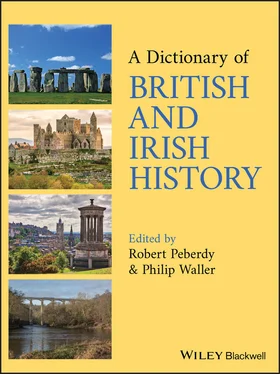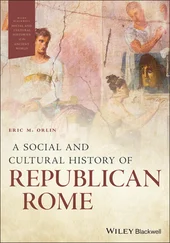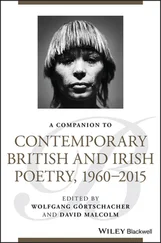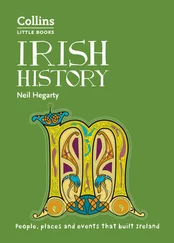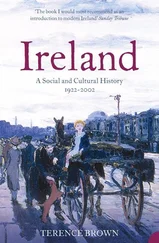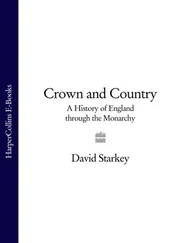Banks created an outstanding herbarium (collection of dried plants, now at the Natural History Museum, London). From 1773, as effectively the director, he made the Royal Botanical Gardens at Kew (Surrey) a leading research centre. As the longest serving president of the Royal Society (1778 to death), Banks encouraged the exchange of scientific ideas within Great Britain and overseas. He was created a baronet (1781).
BANNOCKBURN, BATTLE OFFought S of STIRLING (C Scotland) on 23–24 June 1314. About 8000 Scots under King ROBERT I defeated about 17,000 English under King EDWARD II. The English were seeking to prevent the surrender of Stirling Castle (a last English stronghold in Scotland). Robert afterwards dealt with his enemies in Scotland (see CAMBUSKENNETH PARLIAMENT). The defeat worsened Edward's position in England, although England withheld recognition of Scotland's independence (until 1328). See also SCOTTISH–ENGLISH RELATIONS 1290 TO 1357. BAPTISTS, ENGLAND
Protestant Christian DISSENTERS who practise baptism of adult believers (not infants). Influenced by John Smyth (d. 1612), who rebaptized himself, English Baptists established a church in LONDON in 1612. From 1633 they divided into General and Particular Baptists, the latter adhering to CALVINISM. Baptists contributed to radical politics in the mid 17th century ( see ENGLISH REVOLUTION SECTS). They were persecuted after the RESTORATION (1660) but granted freedom of worship by the TOLERATION ACT (1689).
Numbers declined from the early 18th century. Congregations formed county associations from 1764. In 1770, after many congregations had drifted into UNITARIANISM, evangelical General Baptists created the New Connexion. In 1790 there were 2800 New Connexion and 17,000 Particular Baptists. The latter created a General Union in 1813.
Baptists increased rapidly in the 19th century, sustained by prominent preachers such as C.H. Spurgeon (1834–92). In 1891 the General Union and New Connexion formed the Baptist Union of Great Britain and Ireland. English membership peaked in 1907 at almost 268,000 (attendance at services differed). Membership then declined to 173,000 in 1970, 130,000 in 2010. See also NONCONFORMITY AND DISSENT, ENGLAND.
BAPTISTS, IRELANDsee NONCONFORMITY AND DISSENT, IRELAND BAPTISTS, SCOTLANDsee DISSENT, SCOTLAND BAPTISTS, WALESsee NONCONFORMITY AND DISSENT, WALES BARBADOS
An island and former English colony in the WEST INDIES (British from 1707). It was uninhabited when English settlers arrived in 1627. After initially cultivating tobacco as an export crop, they switched in the 1640s to sugar, which thereafter dominated the economy and stimulated the SLAVE TRADE. Sugar was grown on PLANTATIONS owned by a ‘plantocracy’ and worked by slaves from WEST AFRICA. Barbados was a ‘proprietary colony’ (colony held by owners under the Crown). A House of Assembly was founded in 1639. Slaves outnumbered free men after 1650.
A major slave revolt occurred in 1816, and emancipation was granted in 1834. Barbados became a CROWN COLONY in 1885. The Assembly was elected by universal suffrage from 1951. Barbados belonged to the Federation of the West Indies 1958–62 and became independent in 1966 (with the British monarch as head of State). Approx. population in 1921, 156,000; in 1965, 244,000.
BARBER, ANTHONY(b. 4 July 1920 at Hessle, Yorkshire, England; d. 16 Dec. 2005 at Ipswich, Suffolk, England, aged 85). A tax barrister, Barber was a Conservative MP (1951–64, 1965–74), and held posts in the British government in the 1950s–60s. He was Party chairman 1967–70. In 1970 he succeeded Ian MACLEOD as chancellor of the Exchequer, under Edward HEATH. He initially reduced public spending, but fear of rising unemployment prompted a reflationary Budget (March 1972). The ensuing ‘Barber boom’ (1973) resulted in accelerating INFLATION, a statutory INCOMES POLICY, a MINERS’ STRIKE and the government’s downfall. Barber left politics in 1974 and was created Lord Barber. BAREBONE’S PARLIAMENTIn England, 1653, during the Commonwealth, a single‐chamber assembly which replaced the RUMP PARLIAMENT. Its 137 members were nominated by the Army Council to represent English counties, Wales, Scotland and Ireland. Convened on 4 July, it surrendered power to Oliver CROMWELL on 12 Dec. after moderates became alarmed by demands for radical reform of law and tithes. The Parliament’s nickname, derived from London MP and preacher Praise‐God Barebone, was intended to defame the assembly as a body of religious fanatics. See also COMMONWEALTH AND PROTECTORATE. BARING, EVELYN(b. 26 Feb. 1841 at Cromer, Norfolk, England; d. 29 Jan. 1917 at London, England, aged 65). From a banking family, Baring became a financial administrator in Egypt (1876–80; controller‐general of finance from 1879), and India (1880–3). In 1883, following Great Britain’s intervention, he was appointed consul‐general to EGYPT, becoming effectively its ruler. He reformed Egypt’s finances and introduced agricultural, social and legal improvements. He supported reconquest of SUDAN (undertaken 1896–8) and creation of a condominium (jointly ruled country). Baring was created Lord Baring (1892), Viscount Cromer (1899) and earl of Cromer (1901). He retired in 1907. BARLOW, WILLIAM
(b. c .1480 in Essex, England; d. 13 Aug. 1568 at Chichester, Sussex, England, aged about 88). Originally an Augustinian canon, by 1535 Barlow supported Church reform ( see REFORMATION, ENGLAND) and was appointed prior of Haverfordwest (SW Wales) by Anne BOLEYN. In 1536 he became bishop of ST ASAPH (NE Wales), then of ST DAVIDS (SW). He attacked popular devotion to relics, saints and pilgrimages.
Under King EDWARD VI, Barlow moved (1548) to Bath and Wells (SW England), but resigned after MARY's accession (1553). Imprisoned, he recanted and then fled abroad. Under ELIZABETH, he was bishop of Chichester (S England) from 1559. His five daughters all married bishops. See also REFORMATION, ENGLAND/WALES.
BARNETT, SAMUEL(b. 8 Feb. 1844 at Bristol, Gloucestershire, England; d. 17 June 1913 at Hove, East Sussex, England, aged 69). A Church of England clergyman who ministered in London from 1867, Barnett helped to found the CHARITY ORGANISATION SOCIETY (1869). In 1884 he started Toynbee Hall in the deprived East End where university students could live among the poor (he was warden 1884–1906). It inaugurated the UNIVERSITY SETTLEMENT MOVEMENT. Barnett also catered for spiritual and recreational deprivation by founding the Whitechapel Art Gallery (1901) and supporting country holidays for slum children. BARONIn England, term used in the late 11th–14th centuries for an important tenant‐in‐chief of the king (derived from Latin baro, meaning ‘man’). Barons, including EARLS, comprised the upper NOBILITY. In the 13th century they were known collectively as the ‘baronage’. During the 14th century the summoning of earls and selected barons to PARLIAMENT, and the creation of new ranks of nobility, transformed the status of baron to that of the lowest rank in the PEERAGE (lords summoned individually to Parliament). See also SOCIAL STRUCTURE, ENGLAND 1066 TO 16TH CENTURY. BARONETA hereditary status and title bestowed in England and Wales from 1611, ranking below the PEERAGE (nobility) and above KNIGHTS (i.e., part of the GENTRY). It was created by King JAMES VI/I as a means of raising money to tackle the Crown’s shortage of funds after the failure of the GREAT CONTRACT. Income from sales of baronetcies was used to defend English settlements in ULSTER (N Ireland). Baronetcies were conferred for Ireland from 1619, and for Scotland and NOVA SCOTIA from 1625. BARONIAL CONFLICT AND WARS
Читать дальше
